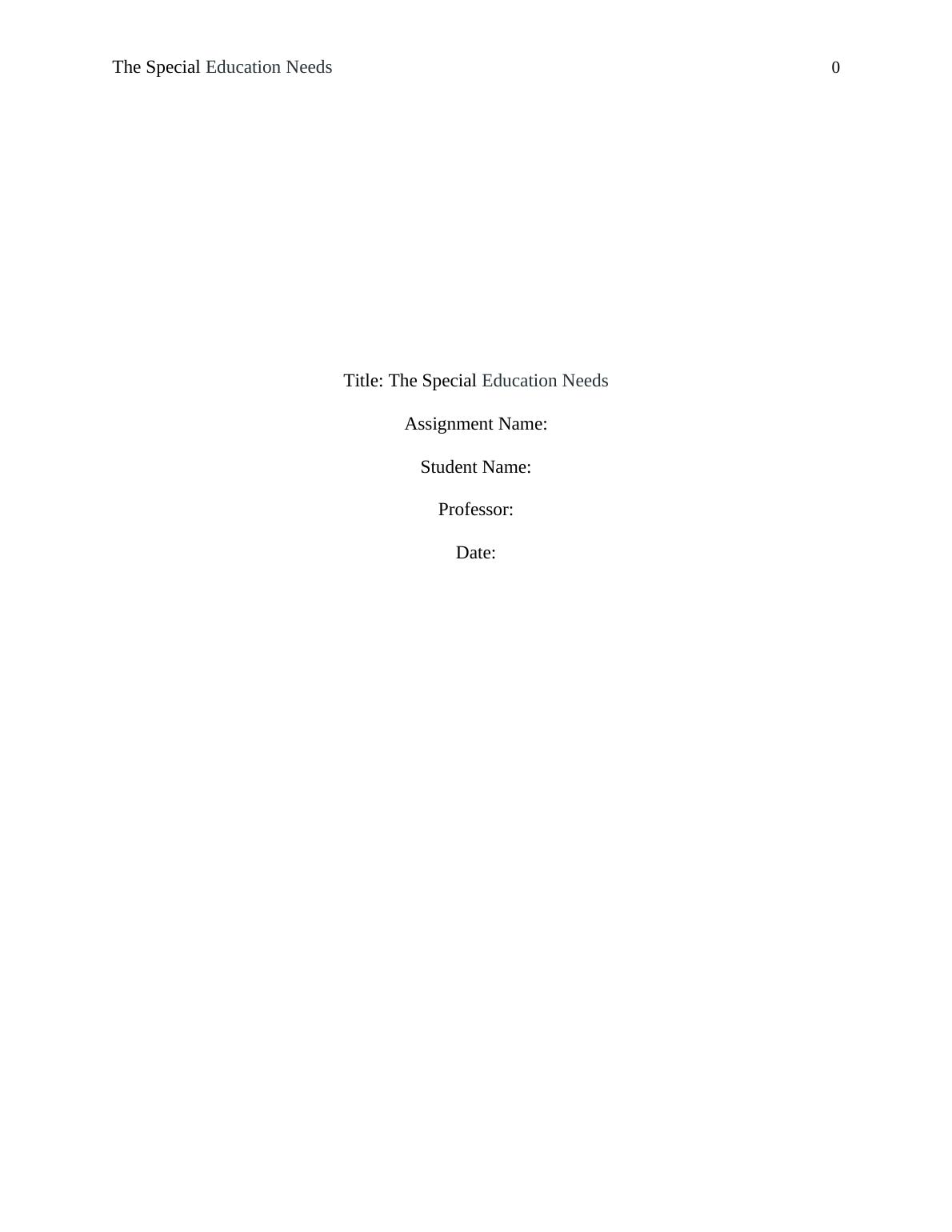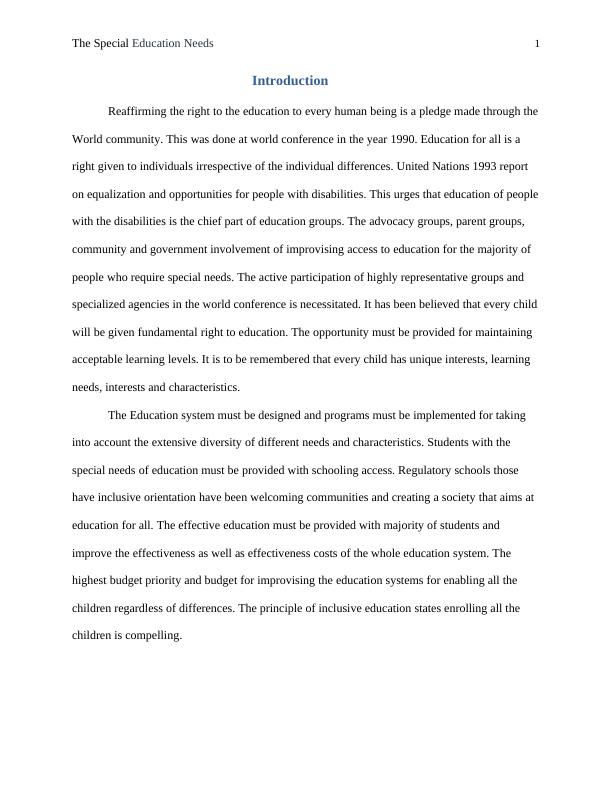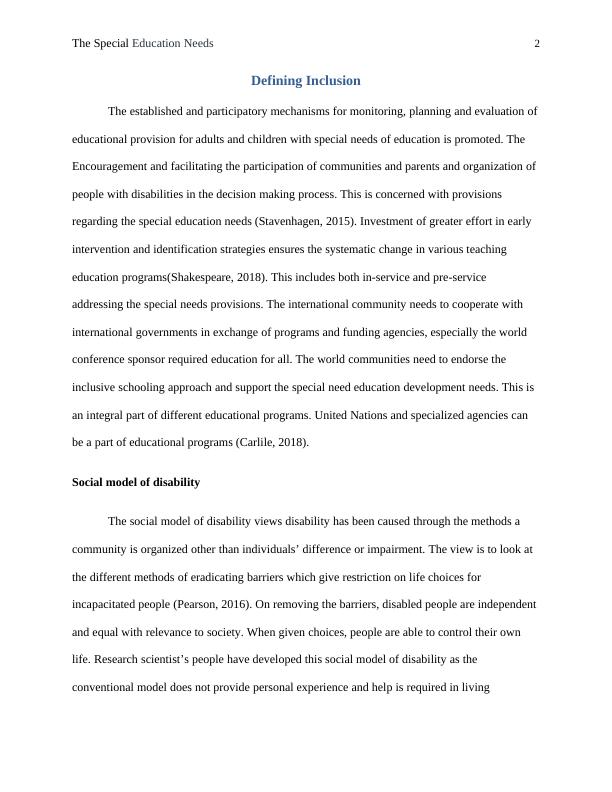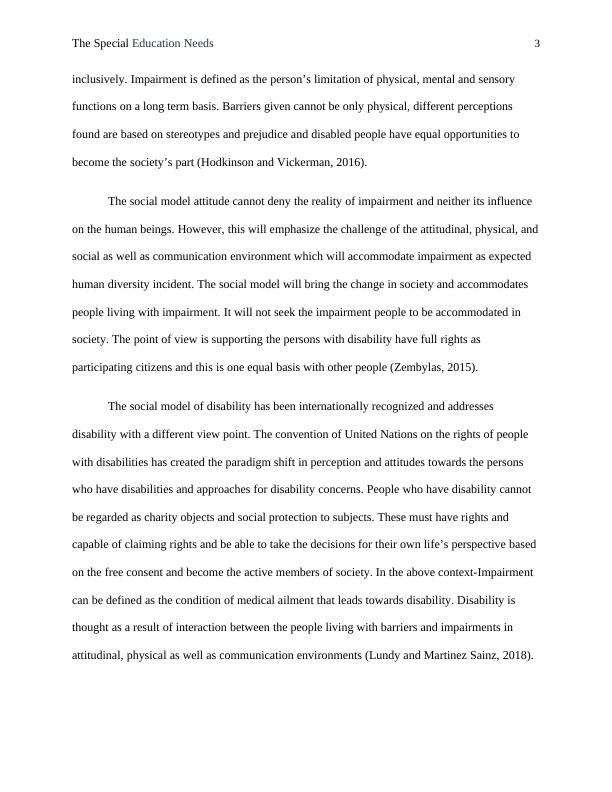Special Education Needs PDF
13 Pages3642 Words188 Views
Added on 2021-10-14
Special Education Needs PDF
Added on 2021-10-14
ShareRelated Documents
The Special Education Needs 0
Title: The Special Education Needs
Assignment Name:
Student Name:
Professor:
Date:
Title: The Special Education Needs
Assignment Name:
Student Name:
Professor:
Date:

The Special Education Needs 1
Introduction
Reaffirming the right to the education to every human being is a pledge made through the
World community. This was done at world conference in the year 1990. Education for all is a
right given to individuals irrespective of the individual differences. United Nations 1993 report
on equalization and opportunities for people with disabilities. This urges that education of people
with the disabilities is the chief part of education groups. The advocacy groups, parent groups,
community and government involvement of improvising access to education for the majority of
people who require special needs. The active participation of highly representative groups and
specialized agencies in the world conference is necessitated. It has been believed that every child
will be given fundamental right to education. The opportunity must be provided for maintaining
acceptable learning levels. It is to be remembered that every child has unique interests, learning
needs, interests and characteristics.
The Education system must be designed and programs must be implemented for taking
into account the extensive diversity of different needs and characteristics. Students with the
special needs of education must be provided with schooling access. Regulatory schools those
have inclusive orientation have been welcoming communities and creating a society that aims at
education for all. The effective education must be provided with majority of students and
improve the effectiveness as well as effectiveness costs of the whole education system. The
highest budget priority and budget for improvising the education systems for enabling all the
children regardless of differences. The principle of inclusive education states enrolling all the
children is compelling.
Introduction
Reaffirming the right to the education to every human being is a pledge made through the
World community. This was done at world conference in the year 1990. Education for all is a
right given to individuals irrespective of the individual differences. United Nations 1993 report
on equalization and opportunities for people with disabilities. This urges that education of people
with the disabilities is the chief part of education groups. The advocacy groups, parent groups,
community and government involvement of improvising access to education for the majority of
people who require special needs. The active participation of highly representative groups and
specialized agencies in the world conference is necessitated. It has been believed that every child
will be given fundamental right to education. The opportunity must be provided for maintaining
acceptable learning levels. It is to be remembered that every child has unique interests, learning
needs, interests and characteristics.
The Education system must be designed and programs must be implemented for taking
into account the extensive diversity of different needs and characteristics. Students with the
special needs of education must be provided with schooling access. Regulatory schools those
have inclusive orientation have been welcoming communities and creating a society that aims at
education for all. The effective education must be provided with majority of students and
improve the effectiveness as well as effectiveness costs of the whole education system. The
highest budget priority and budget for improvising the education systems for enabling all the
children regardless of differences. The principle of inclusive education states enrolling all the
children is compelling.

The Special Education Needs 2
Defining Inclusion
The established and participatory mechanisms for monitoring, planning and evaluation of
educational provision for adults and children with special needs of education is promoted. The
Encouragement and facilitating the participation of communities and parents and organization of
people with disabilities in the decision making process. This is concerned with provisions
regarding the special education needs (Stavenhagen, 2015). Investment of greater effort in early
intervention and identification strategies ensures the systematic change in various teaching
education programs(Shakespeare, 2018). This includes both in-service and pre-service
addressing the special needs provisions. The international community needs to cooperate with
international governments in exchange of programs and funding agencies, especially the world
conference sponsor required education for all. The world communities need to endorse the
inclusive schooling approach and support the special need education development needs. This is
an integral part of different educational programs. United Nations and specialized agencies can
be a part of educational programs (Carlile, 2018).
Social model of disability
The social model of disability views disability has been caused through the methods a
community is organized other than individuals’ difference or impairment. The view is to look at
the different methods of eradicating barriers which give restriction on life choices for
incapacitated people (Pearson, 2016). On removing the barriers, disabled people are independent
and equal with relevance to society. When given choices, people are able to control their own
life. Research scientist’s people have developed this social model of disability as the
conventional model does not provide personal experience and help is required in living
Defining Inclusion
The established and participatory mechanisms for monitoring, planning and evaluation of
educational provision for adults and children with special needs of education is promoted. The
Encouragement and facilitating the participation of communities and parents and organization of
people with disabilities in the decision making process. This is concerned with provisions
regarding the special education needs (Stavenhagen, 2015). Investment of greater effort in early
intervention and identification strategies ensures the systematic change in various teaching
education programs(Shakespeare, 2018). This includes both in-service and pre-service
addressing the special needs provisions. The international community needs to cooperate with
international governments in exchange of programs and funding agencies, especially the world
conference sponsor required education for all. The world communities need to endorse the
inclusive schooling approach and support the special need education development needs. This is
an integral part of different educational programs. United Nations and specialized agencies can
be a part of educational programs (Carlile, 2018).
Social model of disability
The social model of disability views disability has been caused through the methods a
community is organized other than individuals’ difference or impairment. The view is to look at
the different methods of eradicating barriers which give restriction on life choices for
incapacitated people (Pearson, 2016). On removing the barriers, disabled people are independent
and equal with relevance to society. When given choices, people are able to control their own
life. Research scientist’s people have developed this social model of disability as the
conventional model does not provide personal experience and help is required in living

The Special Education Needs 3
inclusively. Impairment is defined as the person’s limitation of physical, mental and sensory
functions on a long term basis. Barriers given cannot be only physical, different perceptions
found are based on stereotypes and prejudice and disabled people have equal opportunities to
become the society’s part (Hodkinson and Vickerman, 2016).
The social model attitude cannot deny the reality of impairment and neither its influence
on the human beings. However, this will emphasize the challenge of the attitudinal, physical, and
social as well as communication environment which will accommodate impairment as expected
human diversity incident. The social model will bring the change in society and accommodates
people living with impairment. It will not seek the impairment people to be accommodated in
society. The point of view is supporting the persons with disability have full rights as
participating citizens and this is one equal basis with other people (Zembylas, 2015).
The social model of disability has been internationally recognized and addresses
disability with a different view point. The convention of United Nations on the rights of people
with disabilities has created the paradigm shift in perception and attitudes towards the persons
who have disabilities and approaches for disability concerns. People who have disability cannot
be regarded as charity objects and social protection to subjects. These must have rights and
capable of claiming rights and be able to take the decisions for their own life’s perspective based
on the free consent and become the active members of society. In the above context-Impairment
can be defined as the condition of medical ailment that leads towards disability. Disability is
thought as a result of interaction between the people living with barriers and impairments in
attitudinal, physical as well as communication environments (Lundy and Martinez Sainz, 2018).
inclusively. Impairment is defined as the person’s limitation of physical, mental and sensory
functions on a long term basis. Barriers given cannot be only physical, different perceptions
found are based on stereotypes and prejudice and disabled people have equal opportunities to
become the society’s part (Hodkinson and Vickerman, 2016).
The social model attitude cannot deny the reality of impairment and neither its influence
on the human beings. However, this will emphasize the challenge of the attitudinal, physical, and
social as well as communication environment which will accommodate impairment as expected
human diversity incident. The social model will bring the change in society and accommodates
people living with impairment. It will not seek the impairment people to be accommodated in
society. The point of view is supporting the persons with disability have full rights as
participating citizens and this is one equal basis with other people (Zembylas, 2015).
The social model of disability has been internationally recognized and addresses
disability with a different view point. The convention of United Nations on the rights of people
with disabilities has created the paradigm shift in perception and attitudes towards the persons
who have disabilities and approaches for disability concerns. People who have disability cannot
be regarded as charity objects and social protection to subjects. These must have rights and
capable of claiming rights and be able to take the decisions for their own life’s perspective based
on the free consent and become the active members of society. In the above context-Impairment
can be defined as the condition of medical ailment that leads towards disability. Disability is
thought as a result of interaction between the people living with barriers and impairments in
attitudinal, physical as well as communication environments (Lundy and Martinez Sainz, 2018).

End of preview
Want to access all the pages? Upload your documents or become a member.
Related Documents
Inclusive Practice in Early Yearslg...
|10
|2143
|34
Inclusive Education in Early Childhood Settingslg...
|12
|3591
|479
Historical, Political, and Curricular Rationales for Inclusive Educationlg...
|4
|1745
|78
Inclusion in Special Education: Models, Strategies, and Benefitslg...
|15
|3790
|337
Early Childhood Studies Article 2022lg...
|13
|4037
|10
Children's Behaviour Assignmentlg...
|9
|514
|132
